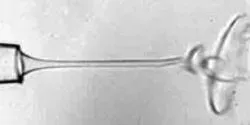News

Researchers from North Carolina State University, Duke University and the University of Copenhagen have created the world’s largest DNA origami, which are nanoscale constructions with applications ranging from biomedical research to nanoelectronics.

An agreement signed Sept. 6 in Shenzhen, China, launches a partnership among the University of California, Berkeley, Tsinghua University and the Shenzhen municipal government promoting research collaboration and graduate student education.

Magnetic reconnection in the Earth and sun's atmospheres can trigger geomagnetic storms that disrupt cell phone service, damage satellites and blackout power grids. Understanding how reconnection transforms magnetic energy into explosive particle energy has been a major unsolved problem in plasma astrophysics.

Industrial wet spinning processes produce fibers from polymers and other materials by using tiny needles to eject continuous jets of liquid precursors. The electrically charged liquids ejected from the needles normally exhibit a chaotic “whipping” structure as they enter a secondary liquid that surrounds the microscopic jets.

In a move that could have huge implications for national security, researchers have created a very sensitive and tiny detector that is capable of detecting radiation from various sources at room temperature. The detector is eight to nine orders of magnitude –100 million to as high as 1 billion — times faster than the existing technology, and a Texas A&M University at Galveston professor is a key player in the discovery.

Imagine saving companies hundreds of thousands of dollars by having college students find cost-saving measures in bits of data as part of a class project. As a leader in business analytics education since 2002, the University of Alabama’s Culverhouse College of Commerce has been doing just that.

The Registration Committee announced Sept. 9 that conferee registration is now open for Pittcon 2015, the world’s largest annual conference and exposition for laboratory science. The event will be held March 8-12, 2015, at Ernest N. Morial Convention Center, New Orleans, Louisiana.














